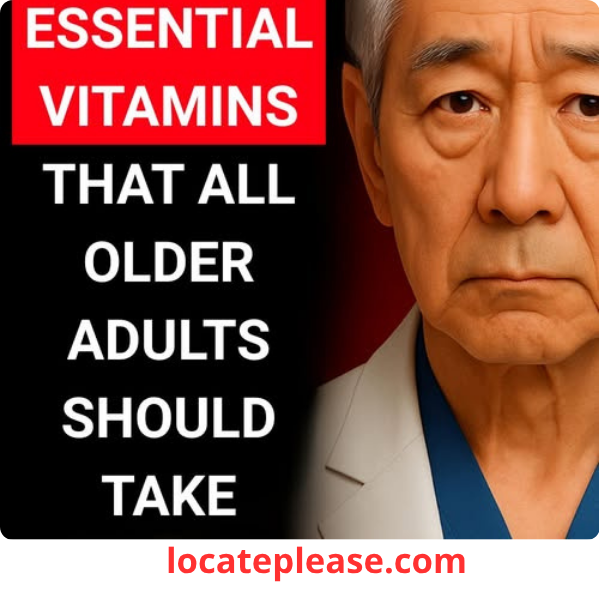As we age, our bodies undergo profound changes. Metabolism slows, digestion becomes less efficient, and the ability to absorb vital nutrients declines. What once came easily — strong bones, sharp memory, and a resilient immune system — now requires more intentional care.
After age 60, even a balanced diet may not provide everything the body needs. That’s why vitamin supplementation becomes not just helpful, but essential for maintaining energy, vitality, and long-term health.
While no supplement replaces healthy eating, certain vitamins become increasingly difficult to obtain in adequate amounts through food alone. Here are the 4 essential vitamins every older adult should consider — backed by science and crucial for thriving in later life.
1. Vitamin D – The Guardian of Bones and Immunity
Why it’s essential:
As we age, our skin becomes less efficient at producing vitamin D from sunlight — and many of us spend more time indoors. This puts older adults at high risk for deficiency, which is linked to weak bones, muscle weakness, and increased infection risk.
Key Benefits:
- Enhances calcium absorption, preventing osteoporosis and fractures
- Strengthens immune function, reducing risk of colds and infections
- Supports muscle strength, lowering the risk of falls
- May help prevent autoimmune conditions and mood disorders
How You’ll Feel the Difference:
- Reduced joint and bone pain
- Fewer illnesses during cold and flu season
- Improved balance and physical resilience
Tip:
Aim for 15 minutes of midday sun exposure several times a week. For many, especially in winter or with limited sun access, a daily supplement (800–1000 IU) is recommended. Always consult your doctor and request a blood test to check your levels.
2. Vitamin B12 – The Brain and Energy Booster
Why it’s essential:
Vitamin B12 is critical for nerve function, red blood cell production, and brain health. But as we age, stomach acid production declines — making it harder to absorb B12 from food. Up to 20% of adults over 60 are deficient, often without knowing it.
Key Benefits:
- Prevents megaloblastic anemia, which causes fatigue and weakness
- Supports cognitive function and may reduce risk of memory loss and dementia
- Boosts energy levels and combats age-related fatigue
- Maintains healthy nerve function and balance
How You’ll Feel the Difference:
- Sharper mental clarity and focus
- Less brain fog and forgetfulness
- Increased energy and stamina
Tip:
Choose methylcobalamin (the active form of B12) in sublingual (under-the-tongue) or liquid form for better absorption. Doses of 500–1000 mcg daily are safe and effective. Fortified cereals and animal products help, but supplements are often necessary.
3. Vitamin C – The Shield Against Infections and Aging
Why it’s essential:
Known for its immune-boosting power, vitamin C is a potent antioxidant that protects cells from damage, supports collagen production, and enhances iron absorption — all of which become more important with age.
Key Benefits:
- Strengthens immune defenses against viruses and infections
- Promotes wound healing and skin repair
- Fights oxidative stress, a key driver of aging
- Supports heart and blood vessel health
- May slow age-related vision loss
How You’ll Feel the Difference:
- Fewer colds and faster recovery
- Healthier, more resilient skin
- Reduced inflammation and joint discomfort
Tip:
Eat plenty of citrus fruits, bell peppers, strawberries, and broccoli. Since the body doesn’t store vitamin C, daily intake is crucial. A 500 mg supplement is safe and beneficial, especially during colder months.
4. Vitamin E – The Protector of Skin, Eyes, and Heart
Why it’s essential:
Vitamin E is a powerful antioxidant that defends cells from free radical damage — a major contributor to chronic diseases and aging. It’s especially important for skin health, eye function, and cardiovascular protection.
Key Benefits:
- Shields cells from oxidative stress
- Supports healthy circulation and heart function
- Helps maintain vision and eye health, reducing risk of macular degeneration
- Keeps skin hydrated, elastic, and youthful
- May slow cognitive decline
How You’ll Feel the Difference:
- Softer, less dry skin
- Improved eye comfort and clarity
- Greater overall vitality and reduced fatigue
Tip:
Get vitamin E naturally from nuts (especially almonds), seeds, spinach, and vegetable oils. A supplement of 400 IU or less daily can help fill gaps — but avoid high doses unless advised by a doctor.
Why Vitamin Supplementation Is Crucial After 60
After age 60, the body simply doesn’t absorb or produce certain nutrients as efficiently. Even healthy eaters can fall short. Supplementation helps bridge the gap and prevent deficiencies that lead to:
- Fractures and falls
- Memory issues
- Chronic fatigue
- Weakened immunity
- Poor wound healing
Think of supplements as nutritional insurance — a small step with big rewards for long-term health.
Tips for Better Vitamin Absorption
Maximize the benefits of your vitamins with these simple habits:
✅ Pair fat-soluble vitamins (D and E) with healthy fats
Eat them with avocado, olive oil, nuts, or fatty fish to boost absorption.
✅ Avoid coffee and tea with meals
Tannins in tea and coffee can block absorption of iron and some vitamins. Wait 30–60 minutes after eating.
✅ Stay hydrated
Water helps transport nutrients through your body. Drink plenty throughout the day.
✅ Take vitamins at the right time
- B12 — Best in the morning (boosts energy)
- D and E — With a meal containing fat
- C — Anytime, but spread out if taking high doses
Final Thoughts: Age Gracefully, Live Fully
Growing older doesn’t have to mean slowing down. With the right support, you can maintain energy, strength, and clarity well into your 70s, 80s, and beyond.
The four essential vitamins — D, B12, C, and E — are not miracle cures, but they are foundational tools for healthy aging. Combined with a nutritious diet, regular movement, and medical guidance, they can help you live not just longer — but better.
So talk to your doctor, get your levels checked, and give your body the support it deserves.
🌟 Because the best years don’t have to be behind you — they can still be ahead.






